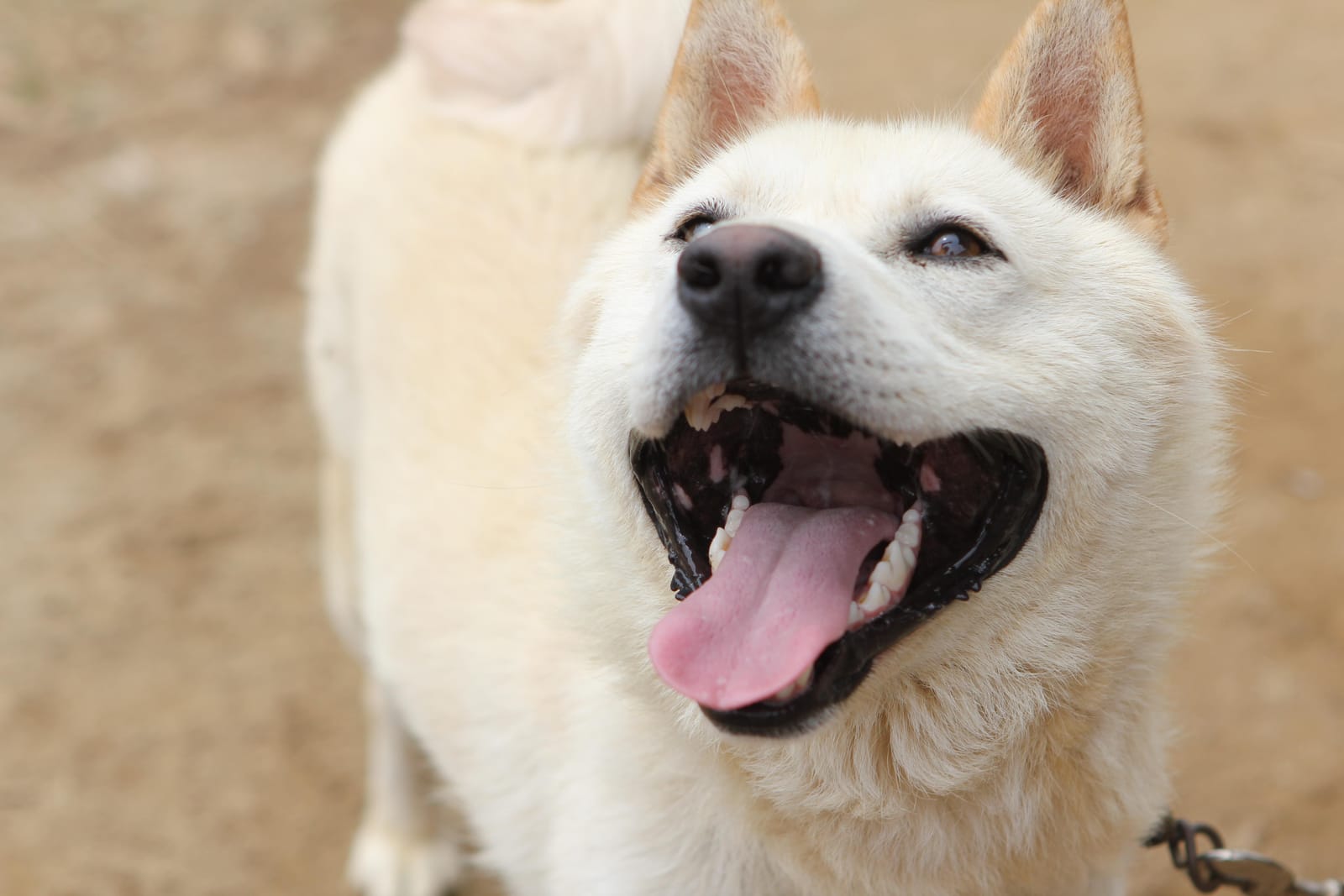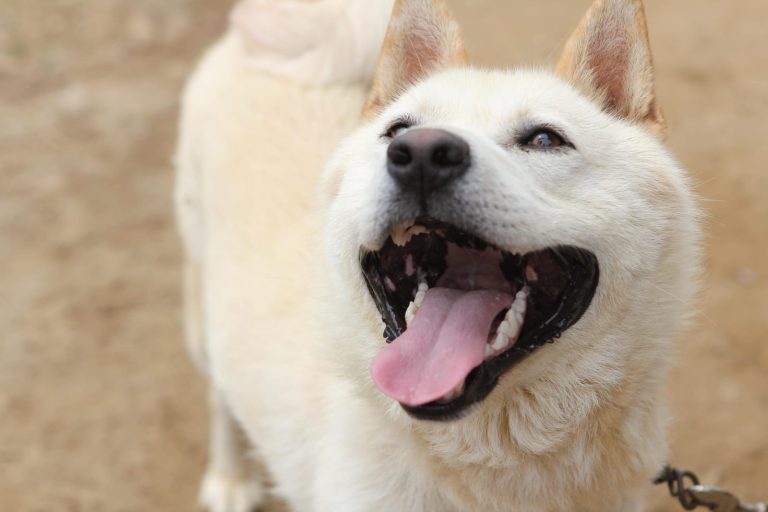The Jindo and Shiba Inu have rich histories rooted in their respective Asian homelands. These breeds developed unique traits suited to their native environments and roles. Let’s explore these two amazing dog breeds.
If you’re still on the market to buy a Jindo or Shiba Inu, PuppySpot currently offers a $300 discount using the code PUPPY300, just click the banner below!
Physical Characteristics and Appearance
Jindos and Shiba Inus have distinct looks that set them apart. These Asian breeds share some features but differ in size, build, and coat types.
Jindo Size and Build
- Jindos are medium-sized dogs with a muscular build. They typically stand 18-22 inches tall at the shoulder. Males weigh 40-55 pounds, while females are slightly smaller at 35-45 pounds.
- Jindos have a strong, athletic body shape. Their heads are wedge-shaped with erect ears. They have almond-shaped eyes that give them an alert expression.
- A distinctive feature is their curled tail, which sits high on their back. This adds to their proud, confident appearance.
Shiba Inu Features
- Shiba Inus are smaller than Jindos. They stand 13-17 inches tall and weigh 17-23 pounds. Their compact size makes them well-suited for apartment living.
- Shibas have a fox-like appearance with a pointed muzzle and triangular ears. Their eyes are dark and expressive, often described as having an alert and spirited look.
- Like Jindos, Shiba Inus have a curled tail. Their body is muscular and well-proportioned, giving them an agile and nimble appearance.
Coat Types and Shedding
Both breeds have double coats, but there are differences in texture and shedding patterns.
Jindos have a thick double coat that comes in several colors:
- White
- Red
- Black
- Brindle
- Gray
Their outer coat is straight and harsh, while the undercoat is soft and dense. Jindos shed moderately year-round, with heavier shedding twice a year.
Shiba Inus have a plush double coat that’s shorter than the Jindo’s. Common colors include:
- Red
- Black and tan
- Cream
Their coat is soft to the touch but stands off the body. Shibas are heavy shedders, especially during seasonal changes. Regular brushing is essential for both breeds to manage loose fur.

Behavior and Temperament
Jindos and Shiba Inus have distinct personalities that set them apart. Both breeds are known for their intelligence and independence, but they differ in key ways.
Understanding Jindo Personality
- Korean Jindos are fiercely loyal and protective. They form strong bonds with their families and can be wary of strangers.
- Jindos are alert and make excellent watchdogs. They have a calm demeanor but can be energetic when needed.
- These dogs are highly intelligent and trainable, though they can be stubborn at times. Jindos require consistent training and socialization from an early age.
- They’re not overly affectionate but show their love through loyalty and devotion. Jindos can be aloof with strangers but are loving towards their family members.
Shiba Inu Disposition
- Shiba Inus are often described as cat-like due to their independent nature. They’re confident and spirited dogs with a bold personality.
- These dogs are intelligent but can be challenging to train due to their stubborn streak. Shibas require patience and positive reinforcement methods.
- Shiba Inus are alert and make good watchdogs. They’re generally quiet but can be vocal when excited or alarmed.
- While affectionate with their families, Shibas can be aloof with strangers. They’re playful and energetic, enjoying daily exercise and playtime.
Independent Nature and Stubbornness
Both Jindos and Shiba Inus are known for their independent spirits. This trait stems from their hunting backgrounds. These breeds can be stubborn, making training a challenge. Consistency and positive reinforcement are key.
- Jindos: More willing to please their owners
- Shiba Inus: More likely to do things on their own terms
Both breeds benefit from early socialization and training to manage their strong-willed natures. Patience and understanding are crucial when working with these intelligent but sometimes headstrong dogs.
Training and Socialization
Training and socializing Jindos and Shiba Inus requires patience and consistency. Both breeds have strong-willed personalities that can make obedience challenging. Early socialization is key for developing well-adjusted adult dogs.
Effective Training Techniques
- Shiba Inus and Jindos are highly intelligent but can be stubborn during training. Positive reinforcement works best for both breeds. Use treats, praise, and play to motivate them.
- Short, fun training sessions keep their interest. Clicker training can be effective. Be firm and consistent with rules and expectations.
- Mental stimulation is important. Puzzle toys and obedience games prevent boredom. Both breeds excel at agility and scent work activities.
- Patience is crucial. Jindos and Shibas may test boundaries. Stay calm and redirect unwanted behaviors. Never use harsh corrections, as this can damage the bond with these sensitive breeds.
Importance of Early Socialization
- Proper socialization is vital for Jindos and Shiba Inus. Expose puppies to various people, animals, and environments from 3-16 weeks old. This builds confidence and prevents fear or aggression later.
- Enroll in puppy classes for structured socialization. Arrange playdates with friendly, vaccinated dogs. Introduce new sights, sounds, and textures at home.
- Continue socializing throughout adulthood. Both breeds can be aloof or wary of strangers without ongoing exposure. Regular walks in different areas provide mental stimulation and social opportunities.
- Supervise all interactions. Respect the dog’s comfort level and never force socialization. Positive experiences build trust and create well-adjusted companions.
Exercise and Activity Needs
Both Jindos and Shiba Inus have high energy levels and need regular exercise. These breeds require daily physical activity and mental stimulation to stay happy and healthy.
Maintaining a Jindo’s Energy Levels
- Jindos are active dogs with high exercise needs. They thrive on long walks, runs, and hikes. A Jindo should get at least 60-90 minutes of exercise daily.
- These dogs excel in agility training and dog sports. Their hunting instincts make them great at scent work and tracking activities.
- Jindos need a mix of physical and mental exercise. Puzzle toys and training sessions help keep their minds sharp.
- Without enough activity, Jindos may become bored and destructive. Regular exercise prevents behavior problems and keeps them fit.
Shiba Inu Exercise Preferences
- Shiba Inus have moderate exercise needs. They enjoy 30-60 minutes of daily activity split into two sessions.
- Short walks and play sessions in a fenced yard suit them well. Shibas like fetch games and tug-of-war.
- These dogs are agile and enjoy obstacle courses. Their prey drive makes them good at lure coursing.
- Shibas are smart and need mental challenges. Training exercises and food puzzles keep them engaged.
- While active, Shibas also enjoy lounging. They adapt well to apartment living if given enough exercise.

Health and Care
Jindos and Shiba Inus are generally healthy breeds. They have some specific needs and potential health issues to watch for. Proper care can help these dogs live long, happy lives.
Common Health Concerns
- Patellar luxation can affect both Jindos and Shiba Inus. This knee problem may cause lameness or pain.
- Hip dysplasia is another joint issue to monitor in both breeds. Regular vet check-ups can catch these problems early.
- Shiba Inus may develop eye problems like cataracts or glaucoma. Jindos can be prone to hypothyroidism, which affects hormone production.
- Both breeds can live 12-15 years with good care. Genetic testing can help identify potential health risks.
Grooming Essentials
- Jindos and Shiba Inus have thick double coats that shed heavily twice a year. Regular brushing is key, especially during shedding seasons.
- A slicker brush or deshedding tool works well for both breeds. Aim to brush 2-3 times a week, more during shedding periods.
- Bathe these dogs only when needed, as too much washing can dry out their skin. Trim nails regularly and check ears for signs of infection.
- Brush their teeth several times a week to prevent dental issues. Professional grooming is not usually needed for either breed.
Dietary and Nutritional Needs
- Both Jindos and Shiba Inus need a balanced diet rich in protein. High-quality dog food formulated for medium-sized, active breeds is ideal.
- Portion control is important to prevent obesity. Follow feeding guidelines based on age, weight, and activity level.
- These breeds may have sensitive stomachs. Avoid sudden diet changes and monitor for food allergies.
- Fresh water should always be available. Some owners add fish oil to their dog’s diet for coat health.
- Treats should make up no more than 10% of daily calorie intake. Healthy snacks like carrots or apple slices can be good options.



